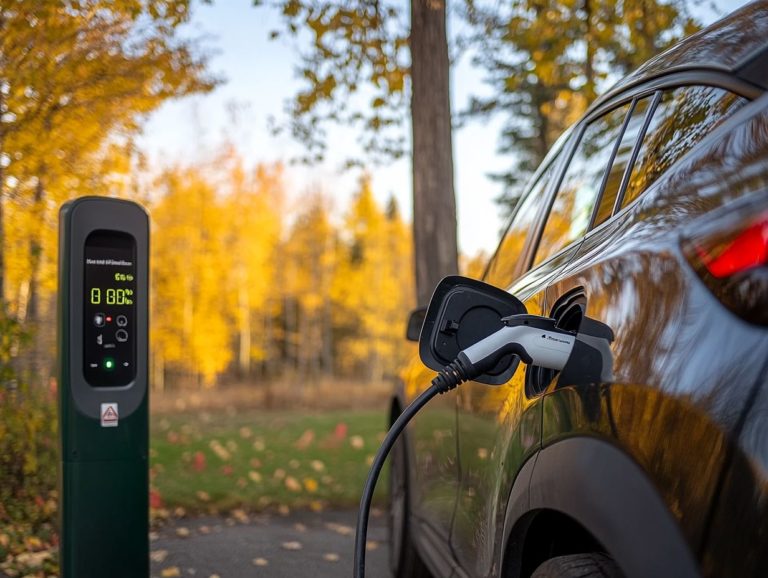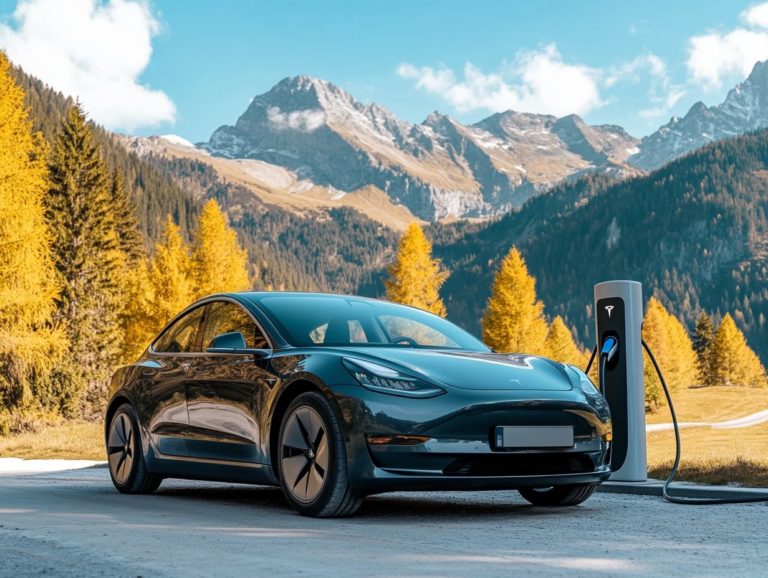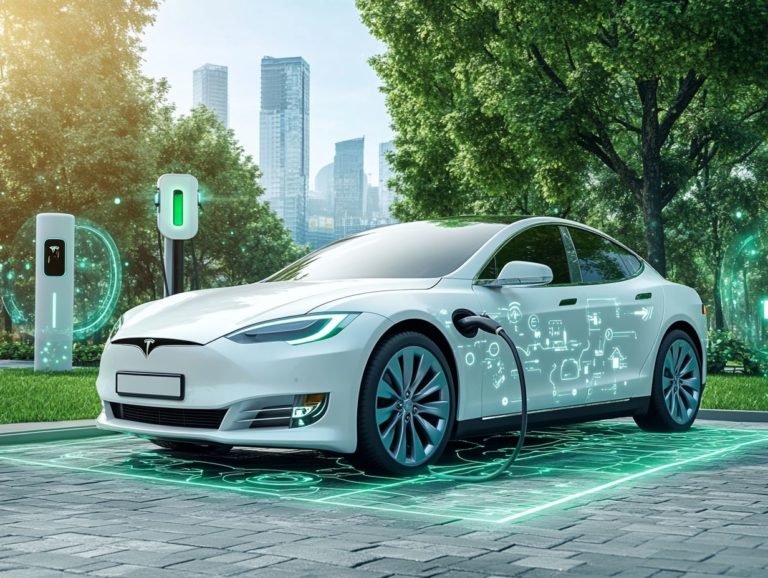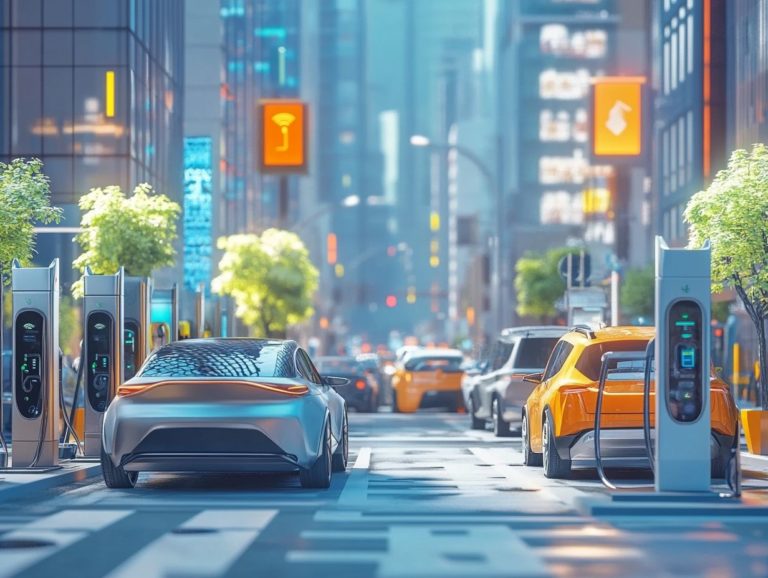Do Electric Cars Require Special Insurance?
As electric vehicles (EVs) rise in popularity, you might be wondering about the intricacies of insuring these cutting-edge cars. What sets electric cars apart from traditional vehicles, and how does this distinction affect your insurance coverage?
This article delves into the unique characteristics of electric cars, the various types of insurance options available, key factors influencing rates, and essential considerations to bear in mind.
By the end, you’ll have a comprehensive understanding of how to secure the best insurance for your electric vehicle.
Contents
- Key Takeaways:
- Overview of Electric Cars and Insurance
- Insurance Coverage for Electric Cars
- Special Considerations for Electric Car Insurance
- How to Find the Best Insurance for Your Electric Car
- Frequently Asked Questions
- Do Electric Cars Require Special Insurance?
- What makes electric cars different from traditional cars when it comes to insurance?
- What are some of the key features of electric car insurance?
- Is electric car insurance more expensive than traditional car insurance?
- Do I need to purchase a separate policy for my electric car?
- Are there any discounts available for electric car insurance?
Key Takeaways:

- Electric cars require special insurance due to their unique features and potential high costs for repairs and maintenance.
- Insurance coverage options and rates for electric cars differ from traditional vehicles. It’s important to consider factors such as battery replacement and the availability of insurance providers.
- To find the best insurance for your electric car, research and compare policies specifically tailored for electric vehicles. Make an informed decision based on your needs and budget.
Overview of Electric Cars and Insurance
Electric vehicles (EVs) have transformed the car market, distinguishing themselves from traditional combustion-engine cars through their unique features, benefits, and insurance requirements.
With the rising popularity of EVs, especially models from brands like Tesla, there s been a notable shift in the auto insurance sector.
Insurance companies are now adapting their products to better serve electric car owners. This overview delves into the relationship between electric vehicles and their insurance, highlighting how factors such as repair costs, insurance premiums, and coverage types are evolving as more consumers opt for sustainable transportation.
What Sets Electric Cars Apart?
Electric cars present distinct advantages over traditional vehicles that are hard to ignore. With lower maintenance costs, superior performance, and a significantly reduced environmental footprint, these vehicles are redefining what it means to drive smartly.
Equipped with advanced technologies like regenerative braking a system that helps recharge the battery while you drive they enhance energy efficiency and extend the lifespan of essential components.
You might be thrilled to know that many electric models offer impressive acceleration and torque, delivering an exhilarating driving experience. Brands like Tesla have truly set the bar high in this market, offering groundbreaking features such as autopilot and over-the-air updates that keep your vehicle at the forefront of innovation.
Owning an electric car can lead to lower insurance premiums. With fewer accidents and a significantly reduced cost of ownership, it s no wonder that more consumers are considering this eco-friendly option as awareness of its benefits continues to grow.
Insurance Coverage for Electric Cars
Insurance coverage for electric cars offers a range of options tailored to meet the distinct needs of EV owners. Collision and comprehensive coverage are vital for safeguarding these cutting-edge vehicles.
Embracing this specialized coverage ensures that you re well-protected as you navigate the roads of the future.
Types of Coverage Available

Electric vehicle insurance offers a range of coverage types, each designed to shield you from the unique risks that come with driving an electric car.
- First up is collision coverage, which is essential for managing damages from accidents. This ensures that you can repair or replace your vehicle without facing a hefty financial burden.
- Then there’s comprehensive coverage, which protects you from non-collision-related incidents such as theft, vandalism, or natural disasters especially important given your investment in electric technology.
Liability insurance is another key component; it protects you from claims for damages caused to others in an accident, easing any worries about personal financial loss. Understanding these various coverage options is crucial for you as an EV owner, as they reflect the potential risks you face and significantly influence your overall insurance premiums.
Don t wait! Start exploring your options today and find the perfect coverage for your electric vehicle!
Factors That Affect Insurance Rates
Several key factors influence your insurance rates for electric cars, including your driving record and the car’s repair costs.
These elements are crucial in determining what you ll ultimately pay. A clean driving history often translates to lower premiums, as insurers view safe drivers as less likely to file claims.
Conversely, repair costs for electric cars can be higher due to advanced technology and specialized parts, significantly impacting your insurance rates.
The electric vehicle market changes frequently, affecting premiums. Understanding these dynamics is essential for navigating the insurance landscape.
Special Considerations for Electric Car Insurance
Insuring electric cars involves a range of special factors that you should be aware of. Notably, you’ll need to consider battery replacement costs and the maintenance savings that often accompany EV ownership.
It’s wise to seek out specialized insurance providers who understand the distinctive needs of electric car owners. This tailored approach guarantees you get the perfect coverage for your lifestyle and car!
Battery Replacement and Maintenance Costs
Battery replacement is a significant factor in the overall cost of owning an electric car, affecting both maintenance costs and insurance rates.
As a prospective electric vehicle owner, understanding the long-term costs of battery replacement is essential, as it can greatly affect your total ownership costs.
Unlike traditional internal combustion vehicles, where routine maintenance tends to be predictable, the potential for costly battery replacements can lead to higher insurance premiums for electric cars.
You may find that the cumulative savings from reduced fuel costs and lower routine maintenance can offset these expenses, especially when considering the reduced likelihood of mechanical issues.
State incentives for electric vehicle adoption can further ease your financial burden, allowing you to enjoy the benefits of sustainable driving without straining your budget.
Availability of Insurance Providers

The availability of insurance providers that specialize in electric car insurance is essential for securing competitive rates and comprehensive coverage options as an EV owner.
As the electric vehicle market continues to grow, these providers are increasingly attuned to your unique needs. Companies like Progressive, Geico, and USAA are adapting their policies to reflect the dynamic nature of the automotive industry.
This adaptation goes beyond just competitive rates; it also includes incentives for safe driving and features specifically designed for electric cars.
You can find coverage for home charging stations and battery replacement, which are crucial for your peace of mind.
By offering flexible terms and distinct policy options, these established insurers significantly shape the insurance landscape for electric vehicles, ultimately enhancing the appeal of owning an EV for you.
How to Find the Best Insurance for Your Electric Car
Securing the best insurance for your electric car requires a meticulous approach, involving comprehensive research and careful comparison of various policies.
This diligence ensures that you obtain the most advantageous coverage at the most competitive rates available.
Researching and Comparing Policies
Researching and comparing insurance policies for electric vehicles is crucial for understanding your coverage options. This helps you pinpoint the best fit for your needs.
Inspect various factors that can significantly influence your decision. Pay close attention to coverage limits, which dictate the maximum payout in the event of a claim, and deductibles, the money you pay before your insurance kicks in.
As a prospective owner, evaluate premium costs to ensure they fit your budget while providing adequate protection. Don t overlook unique features relevant to electric vehicles, like battery coverage or specialized roadside assistance, which can enhance your protection.
By analyzing these elements, you can make an informed choice that gives you peace of mind on the road.
Making an Informed Decision
Making an informed decision about your electric vehicle insurance ensures you meet legal requirements while securing a policy that offers the best value for your investment. Evaluating insurance premiums carefully is essential.
This goes beyond mere compliance; it involves assessing potential discounts specifically for electric vehicles, including incentives for eco-friendly choices.
Comprehensive coverage is vital for protecting your asset against unexpected incidents. Thoroughly exploring these factors enables you to select a policy that fits your financial parameters while accommodating the unique features of electric vehicle ownership.
Ultimately, making well-rounded choices can lead to significant savings and invaluable peace of mind. Start your research today and find the perfect insurance for your electric vehicle!
Frequently Asked Questions

Do Electric Cars Require Special Insurance?
Yes, electric cars require special insurance due to their unique features and technology.
What makes electric cars different from traditional cars when it comes to insurance?
Electric cars have different risk factors and coverage needs compared to traditional cars, which is why they require special insurance.
What are some of the key features of electric car insurance?
Common features of electric car insurance include coverage for battery and charging equipment, increased liability coverage for potential accidents involving high-voltage systems, and coverage for home charging equipment.
Is electric car insurance more expensive than traditional car insurance?
The cost varies based on your car’s make, model, coverage options, and your driving history. In some cases, electric car insurance may be more expensive, but it can also be cheaper in others.
Do I need to purchase a separate policy for my electric car?
Depending on your insurance provider, you may add your electric car to your existing policy or purchase a separate policy specifically for it. Check with your insurance provider for more information.
Are there any discounts available for electric car insurance?
Some insurance companies may offer discounts for electric car owners, such as eco-friendly or low mileage discounts. It’s worth checking with your insurance provider to see if any discounts apply to your policy.






